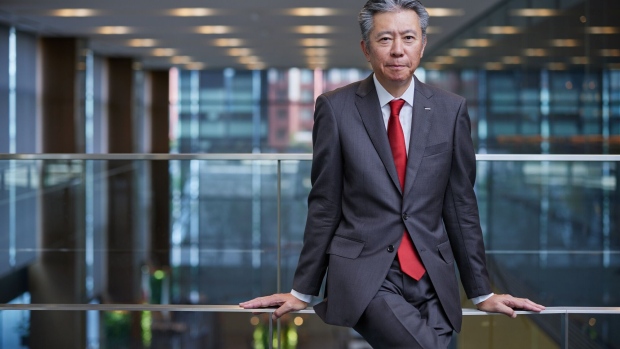Nov 6, 2023
Suntory to Expand Output As Japanese Whisky Sees Global Boom
, Bloomberg News

(Bloomberg) -- Premium Japanese whisky supplier Suntory Spirits Ltd. said output could increase in 2027, as it expands capacity to meet growing global needs.
Suntory Spirits has begun two-year renovations at its distilleries in Yamazaki, near Kyoto, and Hakushu, close to Tokyo, at a cost of about 10 billion yen ($66 million), President Nobuhiro Torii said in an interview. The company has invested more than 60 billion yen in increasing production capacity over the past decade, he said, including expanding storage facilities.
Since it takes time for whisky to mature, Torii — the great-grandson of Suntory founder Shinjiro Torii — said the maker “may be able to ship out a little more” only by around 2027.
Suntory, which marks its whisky business’s 100th anniversary this year, is “keeping its foot on the gas pedal” to increase production, he added.
Sotheby’s has said Suntory’s Yamazaki 55 Years Old long-aged single malt whisky has achieved prices of up to $780,000 at auction, and surpassed Karuizawa 1960 as the most expensive Japanese whisky — symbolizing the popularity of the beverage in overseas markets. The auction house also called Japanese whisky the second most valuable whisky category on the secondary market.
Suntory’s expanded capacity comes as the number of craft whisky distilleries in Japan increases to take advantage of the boom. The number of licensed distilleries specializing in whisky production swelled more than fivefold by 2021 compared to a decade earlier, according to the latest data from Japan’s National Tax Agency.
Better Quality
Torii said the quality of its overseas distilleries was improving. After Suntory Holdings Ltd. acquired US spirits maker Beam Inc. in 2014, it has reviewed processes and changed the firm’s aging period. Torii said he hoped that in the next 10 years, the US-made whisky produced by Beam Suntory would receive even better international recognition. Late last month, Suntory’s blenders from around the world gathered at the Yamazaki distillery to exchange opinions, he said.
Torii started his career in the financial industry as a commercial banker in 1991, and six years later he joined the family business. He used to be responsible for premiumizing Suntory’s beer business, lead the listed beverage subsidiary Suntory Beverage & Food International before he become the president of a alcohol unit.
“A hundred years ago, Japanese whisky production was simply copying Scotland, but today’s Japanese whisky has matured and achieved a unique status,” said Adam Carmer, an assistant professor at the University of South Florida who specializes in hospitality and founded whisky-only bar The Whisky Attic.
In a bid to ensure quality as Japanese whisky grows on a global level, major distillers in the country — including Suntory, Nikka Whisky and Kirin Holdings — have agreed to come up with voluntary standards to ensure quality under the Japan Spirits & Liqueurs Makers Association. From April, those standards will be fully applied, stipulating that Japanese whisky must be made with malted grains and other cereal grains, along with water harvested in Japan. Whisky products made from rice by craft brewers will no longer counted as Japanese whisky.
Still, Torii said the new voluntary standards aren’t enough.
The industry “must make efforts to go one step further,” he said, including a need for laws to further clarify the definition of a Japanese whisky.
(Updates with additional standards in 10th paragraph.)
©2023 Bloomberg L.P.


